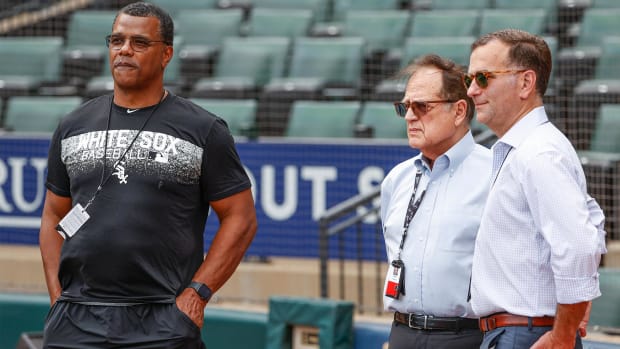The White Sox’ decision to fire executives Ken Williams and Rick Hahn on Tuesday was perfectly reasonable. It was also deeply, almost incomprehensibly shocking.
If those two statements seem at odds with each other, well, these are the White Sox. There’s not always consistent logic to be found. The struggling team has been vexed by a variety of problems this year—underperforming players, frustrating stories out of the clubhouse, poor decisions from above. It only made sense to make a statement by getting rid of the men in charge. Yet that’s not typically the style of White Sox chairman Jerry Reinsdorf.

Kamil Krzaczynski/USA TODAY Sports
The 87-year-old team owner is known as loyal to a fault. That’s a large part of why Williams and Hahn were kept around so long in an industry where churn every few years has come to be seen as normal. Williams, the executive vice president, had been with the club since 2001, and Hahn came aboard in ’02 and was promoted to general manager in ’13. Together, they helped steer the franchise to a World Series title in ’05, to a handful of additional playoff appearances, including one as recently as ’21, and to a whole lot of mess and frustration in between and since. But given the legendary strength of Reinsdorf’s commitments, it seemed all but impossible to think he might actually fire them midseason.
Until, well, he did.
That came through in the team statement about the matter. Here was all the standard language thanking executives for their service, the boilerplate appreciative comments, streaked through with some uncomfortably raw emotion.
“This is an incredibly difficult decision for me to make because they are both talented individuals with long-term relationships at the White Sox,” Reinsdorf was quoted in the statement. “Ken is like a son to me, and I will always consider him a member of my family. I want to personally thank Ken and Rick for all they have done for the Chicago White Sox, winning the 2005 World Series and reaching the postseason multiple times during their tenures. I have nothing but the greatest respect for them as people and appreciate the commitment and passion for the White Sox they exhibited over the years.”
It’s hard to pinpoint just how this season went so wrong for the White Sox. Despite benefiting from the softest division in baseball, they have one of the worst records in the sport, better than only the A’s, Royals and Rockies. The roster is riddled with cases of underperformance: Tim Anderson’s stunning fall into disarray stands out, but look at Yoán Moncada, or Michael Kopech or Yasmani Grandal. There are issues that became apparent last season that have only been left to get worse. The offseason strategy did nothing to address obvious weak spots on the roster. (With all due respect to Andrew Benintendi, a team that makes him the recipient of the biggest contract in franchise history is not one serious about legitimate investment.) And there are plenty of valid questions about development and the way the team uses data to make decisions, too. In short? Anything that could go wrong has gone wrong. There’s been bad luck, but it’s been exacerbated by bad planning and bad strategy.
So: Does getting rid of Williams and Hahn really change anything? It could. But the issues here are deep-seated. And while change at the executive level should be welcome, it’s notable that the real power is still held by Reinsdorf, the man who heard the call for change far, far too late.
“Ultimately, the well-worn cliche that professional sports is results-oriented is correct,” Reinsdorf was further quoted in the team statement. “While we have enjoyed successes as an organization and were optimistic heading into the competitive window of this rebuild, this year has proven to be very disappointing for us all on many levels. This has led me to the conclusion that the best decision for the organization moving forward is to make a change in our baseball department leadership.”
That’s all true. But it’s worth noting that a change in baseball department leadership might not be enough if the larger structure here is still the same.







